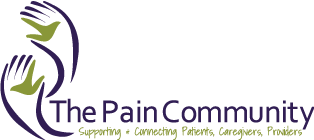Comfort or Chaos: Are You in a Healthy Relationship?
 by Micke A. Brown, BSN, RN
by Micke A. Brown, BSN, RN
Did you ever wonder if those closest to you help or hinder your pain care? Choosing who is around you can make a big difference just as much as whom you choose to be. Which is better to be or be around: toxic or tender, inspiring or demeaning, “Susie [or Simon] Sunshine” or “Debbie [or Donald] Downer”? Have you ever taken stock on your pain levels when you are in the company of hopeful, positive people compared to those who are negative and unhappy? How does your pain respond when you are sharing joy vs. dwelling on your troubles?
How do you even know if you are in a healthy relationship?
Here are some questions to think about:
- Does your partner respect you and your beliefs or is your opinion criticized so that you feel belittled?
- Do you feel like you can be yourself or do you feel you must hide the real you?
- Is your partner supportive of the things you do or is missing in action?
- Does your partner get extremely jealous or possessive?
- Does your partner try to control what you do and who you see and when?
- Are you feeling that you must “watch your back” and afraid your relationship might turn more clearly abusive (mentally, physically, sexually)?
Note: “Partner” can be family, friends, colleagues, significant others, and/or spouses.
What to do if?
I think I may be in an abusive relationship:
Get help right away.
- Talk to a trusted friend, relative, pastor/minister or counselor.
- Contact a crisis hotline.
- If you are afraid you will be hurt for reaching out, call your local domestic violence shelter or the police.
I think a friend or family member is being abused:
Offer support.
- Believe them and confirm that you have seen it too (if you have)
- Tell them you would like to help; offer to be a support person for them.
- Recognized that people who are being abused are often afraid.
- Do not take it personally if the person is angry with you or does not want your help.
- Tell another person – a trusted friend, relative, pastor/minister, teacher, or counselor.
I am hurting someone or afraid that I might:
There is a way to get help to stop.
- Most people do not want to hurt others, especially the people they love.
- Talk to someone you trust, like a friend, relative, pastor/minister, teacher, or counselor.
If you become violent when you use alcohol or other drugs, ask for help for substance abuse.
For more information, see:
- Toll-free, 24- hour Domestic Violence Hotline: 1-800-799-7233 or www.thehotline.org
- Call 911 or the police.
- Talk to a trained professional counselor.
9 Signs of a Healthy Relationship
In 2012, Carol Rawleigh1 provided a list of nine signs of a healthy relationship in which she emphasizes that “in a healthy relationship …you can be yourself”.
- You can express yourself honestly and can be different from one another and enjoy those differences. Additionally, your partner appreciates you for who you are. And, you are glad to have your partner’s support, but you do not need their approval.
- You feel free to spend time apart, enjoy other friends and be with your family.
- You can stay true to your own values, speak your honest opinion and keep up with the activities and interests that are important to you.
- Your partner hears what you say and shows interest in you by taking the time to listen. Your partner looks at you when you talk and lets you finish. Your partner accepts your feelings, ideas and opinions as your own. You reciprocate willingly. Also, when one of you is upset, you feel safe enough to talk things out in a respectful manner.
- You can agree to disagree. If you have a disagreement, you can talk it out and don’t let anger build up. You can also each give a little and/or compromise to come to an agreement or take turns making decisions.
- Your partner respects your boundaries and you can do the same. It is okay for you to say, “I cannot be with you every minute,” “Do not tease me in that way,” “I do not want to have sex,” or “I cannot make a decision right now, I need time to think.” With your partner, you feel connected not controlled.
- You are honest with each other. You build trust by being honest and kind, even if the truth is disappointing. For example, you can say, “I forgot, you are right to be upset. I am sorry” or “I like you but I am not sure how serious I want to be. Let’s take our time and see how things work out.” Each person has a role and responsibility in the relationship. Your partner is responsible for his or her own behavior and does not blame others.
- You have fun together. You can relax, laugh, and enjoy everyday simple things together such as taking a walk in the part, going to the movie or spending time with family. Being quiet together is okay too! You do not feel you have to talk or be busy every minute.
- Your partner uses language and words that lifts you up and encourages you. You return in kind. You are each other’s cheerleader and coach. Some examples include:
- Encourage: “I believe you can do it!”
- Notice: “I like how you are patient with your parents.”
- Respect: “I will put these earphones on so you can read.”
- Appreciate: “Thank you for helping out.”
- Invite: “Would you like to go out to dinner tomorrow evening?”
- Point out the positive: “You have a great smile; a wonderful hug!”
The 4 C’s to Effective Relationships
Being in relationship with family, friends, colleagues, significant others, and spouses feels good when you treat each other with respect and value your differences. Additionally, healthy relationships incorporate and follow the 4 C’s to effective relationships:
- Communication,
- Conflict Resolution,
- Compassion,
- Commitment.
Creating and nurturing a healthy relationship takes time (i.e., patience and pacing), no matter if with a family member, friend, colleague or potential partner. Taking it slow and allowing time to get to know one another and what each other value is important. Having key conversations about the relationship as it evolves along the way encourages acceptance and understanding. After all, each person grows as life is experienced and lessons are learned along the way. A healthy relationship must remain flexible and adapt to change.
How do you know if your relationship(s) is or has become unhealthy and/or abusive?
These are signs of an unhealthy relationship:
- Does your partner criticize you, call you names, put you down or say things on purpose that hurt your feelings, and/or make fun or insult your looks, thoughts, ideas or beliefs?
- Does your partner try to keep you from friends or an activity you like, becomes very jealous or possessive, tells you what you can and cannot wear, ignores you or remains silent when you talk and/or must win a discussion or argument lest becomes angry or violent?
Here are signs of an abusive and/or violent relationship:
- Does your partner threaten, scare or harm you (e.g., hit, push, kick or other forms of physical harm) or forces you to do something you do not want (such as having sex or using alcohol or other drugs)?
Traits of an Abusive Relationship
Mardi Richmond (2010)2 has listed the following traits of what makes a relationship abusive:
- Abuse can take many forms, including physical (i.e., hitting), sexual (i.e., forcing someone to have sex), and/or emotional (i.e., putting the person down or trying to control the person’s actions)
- A sign of an abusive relationship can include when a person may be afraid of their partner or are trying to avoid his or her anger
- Any abuse is bad. There is no such thing as asking for it or deserving it
- Both women and men can be the victims of abusive and/or violent relationships.
According to Richmond, there are three important factors to consider when looking at relationships:
- Conflicts are okay; violence is NOT. People have disagreements and arguments all the time and are normal in relationships. When arguments turn hurtful or violent–that relationship has become unhealthy and abusive.
- Jealousy does not equal love. Everyone gets a little jealous from time to time; yet trust trumps insecurity. To some, it may feel good to know someone cares enough to feel jealous; however when a person acts jealous the majority of the time or tries to control behavior of another (fueled by jealousy/insecurity) there is a problem.
- Abuse is never the “victim’s” fault. Sometimes when being abused, it is hard to see a way out. People stay in abusive relationships for many reasons including the fear of leaving (the unknown, financial concerns, safety concerns), pressure from friends, family and/or spiritual leaders/beliefs or thinking the person will change in time “if only loved or cared for just a little more and a little longer”.
Look, everyone deserves healthy relationships, so being in a relationship with others should not cause ongoing hurt or bad feelings. See how you measure up. Take the Relationship Quiz.
